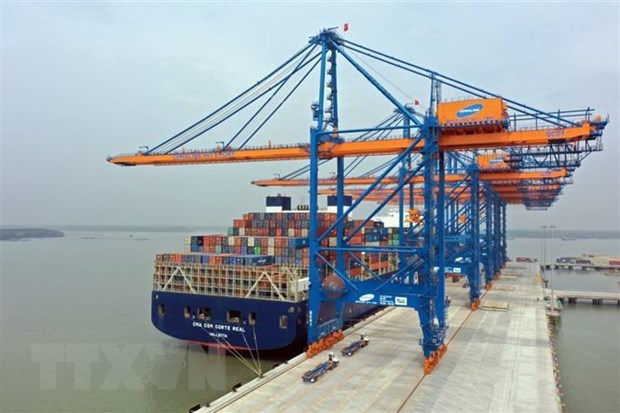ASEAN, Czech Republic look to standardise customs procedures

Loading goods at Cai Mep port in Ba Ria Vung-Tau Province. (Photo: VNA)
The Association of Southeast Asia Nations (ASEAN) Committee in coordination with the Customs Administration of the Czech Republic has held a webinar to introduce the electronic customs of the European country.
Indonesian Ambassador to the Czech Republic Kenssy Dwi Ekaningsih, who is also Chairwoman of the ASEAN Committee in Prague, and Trousir Jiri, Deputy Director General of the Customs Administration of the Czech Republic, co-chaired the event.
It attracted the participation of more than 30 delegates from six embassies of ASEAN countries in Prague and representatives of the Czech businesses.
Tomaš Kocourek, an expert in charge of customs clearance procedures, gave an overview of the Czech customs system.
He said the customs regulations of the country were unified and complied with that of the EU. However, member countries can decide for themselves on value-added tax (VAT) and special consumption tax.
In his presentation, the expert also introduced in detail customs clearance procedures for export, import, and shipment operations in the Czech Republic, including procedures for registration of electronic signatures, registration for customs inspection.
Only about two percent of customs clearance cases in the country are conducted in the traditional form and the rest are all done through electronic customs, he said.
Participants at the webinar shared opinions on factors such as product standardisation, certification of origin, and freight transport procedures.
According to Vietnam Trade Counselor in the Czech Republic Nguyen Thi Hong Thuy, the workshop aims to establish relationships with local customs authorities, creating information channels and cooperation toward simplifying procedures, facilitating the growth of trade in goods between ASEAN and the Czech Republic.
She suggested that more seminars should be organised with specific themes to connect businesses in member countries as well as other organisations specialising in animal and plant quarantine or trade marks regulations.
She said ASEAN countries are a potential market and a promising investment environment that the Czech state and businesses are interested in the near future.
ASEAN countries recognise that traditional handicrafts, agricultural products, food and essential consumer goods have many opportunities to enter the Czech market, she said, adding that this is also a bridge to penetrate the EU market.
In terms of two-way trade relations, Vietnam is the second largest country in ASEAN after Malaysia in import and export turnover with the Czech Republic.
Thuy also said the EU-Vietnam Free Trade Agreement (EVFTA) brings many benefits to Vietnam and the EU, including the Czech Republic, one of the first countries to ratify it.
One of the biggest benefits of the EVFTA is the elimination of 99 percent of tariffs, which saves costs for Vietnamese, Czech and EU exporters and importers. This creates opportunities for Czech businesses to export goods in areas where the country has strengths such as textile-garment industry, glass, automobile, mechanical engineering, food, and chemical.
Vietnam has an action plan to implement the binding provisions of the free trade agreement, including a commitment to sustainable fisheries management, Thuy said, adding that the country has made great efforts in combating illegal, unregulated and unreported (IUU) fishing to meet standards relating to the environment./.
VNA

